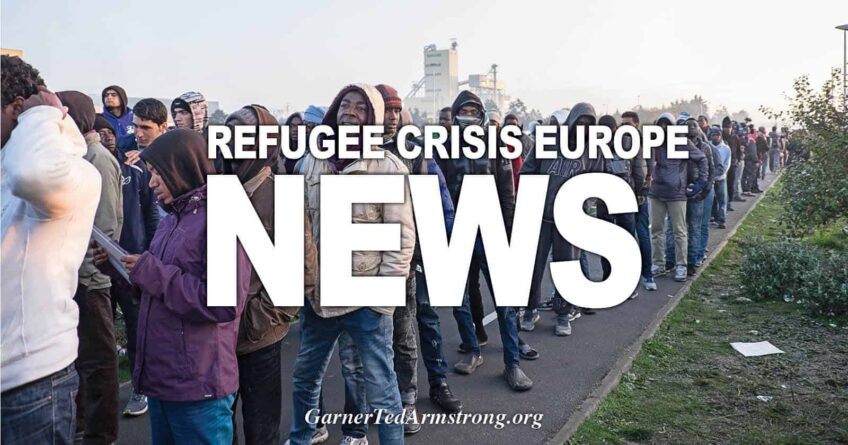In a dramatic attack in the last minute of the match between Belgium and Japan at the World Cup, Nacer Chadli scored the winning goal for Belgium. Before that, Marouane Fellaini had scored the equalizing goal from Eden Hazard’s cross. With a thrilling 3-2 comeback victory, Belgium had reached the quarter-finals. Chadli, Fellaini and star player Hazard brought pride and joy to their team and country.
Meanwhile, in Brussels, European politicians were arguing about how to curb the flow of refugees and immigrants who were escaping conflicts and hunger in their home countries in search of opportunities for a better life across the Mediterranean.
After marathon talks at an EU summit lasting nearly 10 hours, the leaders agreed on a text that tried to appease all sides but without actually solving the crisis, pushing it into extra time and more uncertainty. Leaders agreed EU countries should help migrants rescued in the Mediterranean to alleviate the burden on Italy and Greece, who are the most common first landing points, but the details about how and who would help remained unclear.
The issue of migrants stranded at sea caught the world’s attention when Italy closed its ports to rescue ships, leaving hundreds of desperate people adrift, until Spain stepped in to help. Recognizing the seriousness of the situation and the dilemma it puts Europe in legally and morally, leaders agreed there should be “a shared effort,” but “only on a voluntary basis.” Countries will take in rescued migrants and establish processing centers to assess asylum claims on their soil.
There, “rapid and secure processing” would sift economic migrants from refugees with a potential right to asylum, “for whom the principle of solidarity would apply.” So, does that mean we will see “detention centers” in Europe for migrants who are refused entry?
Leaders also backed plans, broadly agreed by all members, to tighten the EU’s external border, and give more money to countries such as Turkey and Morocco to help prevent migrants leaving for Europe. The EU accord also said governments should “take all necessary internal legislative and administrative measures” to stop refugees and migrants crossing Europe’s internal borders — but what does that actually entail?
However, the bloc dodged an agreement on controversial refugee quotas, as a quartet of central European countries who are anti-immigration completely rejected any language on EU-wide responsibility.
The summit exposed Europe’s long-standing divisions on migration between Central Europe, which refuses to take any refugees, versus western countries, which are seeking “solidarity.”
Trying to find consensus, EU leaders called for migrant processing centers in North African countries — such as Algeria, Egypt, Libya, Morocco, Niger and Tunisia — which are already overwhelmed and unable to handle the influx of migrants attempting to illegally reach Europe. EU leaders agreed to “swiftly explore the concept of regional platforms in close cooperation” with non-EU countries, the UN refugee agency and the International Organization for Migration.
As World Cup progresses, worried migrants will watch the EU immigration issue advance to the semi-final round of negotiations.
Maha Akeel
They tried to persuade the North African countries with a promise of EU funds to help establish and manage the processing centers, but so far none of them have agreed, while a couple have ruled themselves out.
Even the UN vision for the scheme clashes with those of some EU leaders, who stressed on closing borders and stopping arrivals. Hungary’s leader, Viktor Orban, called for a “strong border” to stop what he called an “invasion” of migrants. Due to its geographic location, Hungary is one of the main transit countries of irregular land migration toward other EU member states, with most of the asylum seekers being Syrians, Afghans and Kosovars.
After the spike in numbers in 2015, the Hungarian government constructed fences along its borders with Serbia and Croatia and enacted a series of legal amendments intended to reduce irregular migration through Hungary, resulting in a drop of over 90 percent in 2016. The message is clear: Fences work. Austria is now threatening a similar measure.
This would mark the end of the EU’s iconic passport-free Schengen Area. The German Chancellor Angela Merkel had said at the EU summit in Brussels that migration could “decide the fate of the EU.”
The UN and IOM have called for “strong leadership from European Union member states on upholding the right to asylum and the rights of migrants,” while stressing that the EU could not outsource the problem by pressuring African countries to keep asylum applicants within their borders. What if these countries also decided to shut their borders in the face of fleeing refugees?
Refugees and immigrants are humans and deserve a chance to live a better life and achieve their dreams and aspirations, both for themselves and the country they settle in. Can you imagine the French team that won the World Cup in 1998 without its superstar Zinedine Zidane? Many of the players in the French team at the current World Cup are descendants of Arab and African migrants, including rising star Kylian Mbappe. Almost every Western European team has at least one player of Asian or African origin.
But such achievements are not limited only to sports. Many famous names in medicine, literature, technology and other fields, whether in Europe or the US, are unmistakably of non-European origin.
Fans watched Belgium win their match with Brazil on Friday to advance to the semi-finals, and on Tuesday they will meet France. Worried migrants will also watch the immigration issue advance to the semi-final round of negotiations, with the coming days and weeks seeing more meetings between Germany, Austria, France and Italy.
• Maha Akeel is a Saudi writer. Twitter: @MahaAkeel1
Source: http://www.arabnews.com/node/1335351
[Disclaimer]










